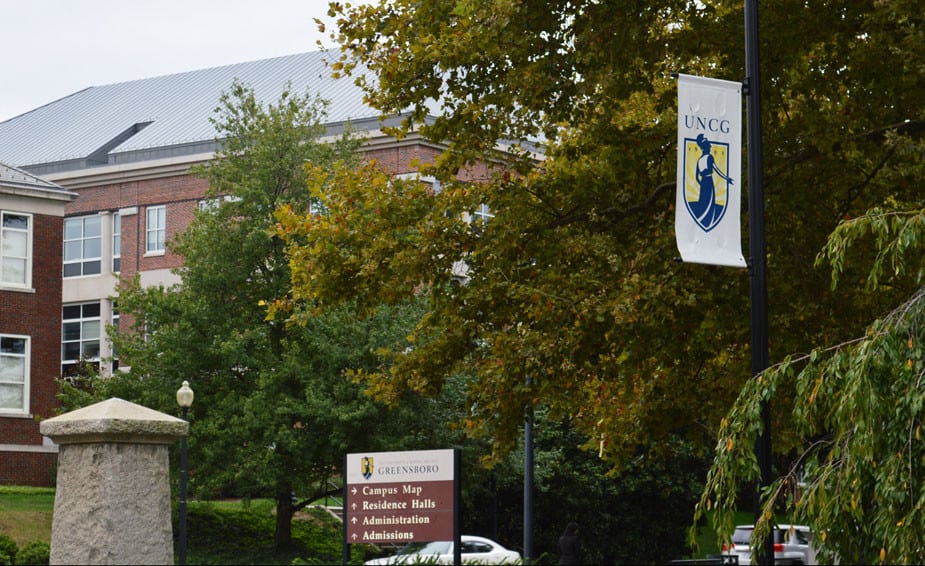A Focus on Hispanic students and the Degrees Matter! Initiative
The University of North Carolina at Greensboro (UNCG) offers an effective initiative geared toward increasing persistence and completion among its Hispanic students, many of whom also tend to be first-generation students. Enrollment of Hispanic students at UNCG has increased by almost 8 percent in the last 10 years without any concerted effort by UNCG. This increase is a testament to the demographic shift in state.
The initiative, which is in its early stages, focuses on the recruitment of the student as well as his or her family.
Targeting the family in earnest addresses an important cultural aspect that is reflected in the very close-knit Hispanic community. Furthermore, because a large number of Hispanic students are first-generation students, getting the family’s support is often difficult in some circumstances.
Pursuing higher education can be very intimidating— from the application process to the physical campus itself— especially for those not familiar with the institution. Aware of this, UNCG is succeeding at making college more accessible by inviting families of incoming Hispanic freshman to come to campus on a Saturday afternoon. The invitation itself is addressed to the family of the student. The first orientation of this kind was very well attended by parents, siblings, and even cousins of the students. In addition, the orientation was entirely in Spanish, a first for UNC-Greensboro.
Not only does this effort help build family support for the student, which will increase persistence and completion, but the approach also introduces higher education as a very real opportunity for other family members. In addition to this tailored orientation for Hispanic students, UNCG is increasing its efforts to provide scholarships specifically for Hispanic students.1
UNCG has strengthened efforts focusing on part-way home students, or those who have “stopped out” temporarily, thanks in large part to a regional effort called Degrees Matter!.
Degrees Matter! is a partnership between The Community Foundation of Greater Greensboro, Opportunity Greensboro, The United Way of Greater Greensboro, and all of the higher educational institutions in the area including community colleges, public four-year universities, and private institutions. The mission of Degrees Matters! is to increase the number of adults in the area with college degrees. The effort targets those adults who have achieved some college credits but dropped out before earning a credential.
With support from the Lumina Foundation, Degrees Matter! has joined the effort to increase degree completion to 60 percent by the year 2025. Currently, about 40 percent of the population in the greater Greensboro area hold some type of credential.2 The graduation rate for returning or transfer students tends to be higher than for other students so that makes this particular population critical to increasing overall attainment levels.
The Spartan Finish Program
The Spartan Finish Program, for example, recruits former UNC-Greensboro students who dropped out with senior status but before degree completion. The university hosts an expansive phonathon twice a year aligned with admissions deadlines. Former students are invited to a “come back” clinic where they are offered the opportunity to return to earn their degree with the support of a network of services. This program was piloted in the spring of 2014 and has seen success.3
Beyond Academics Program
In partnership with a private nonprofit organization, UNC-Greensboro also offers a program called Beyond Academics, which makes a post-secondary credential for students with intellectual and developmental disabilities a reality through a robust support network. The four-year certification program prepares students for 21st century jobs, independent living, and to be engaged, civic-minded members of their communities.
Created in 2007, the program continues to experience great success with demand consistently outpacing availability (with an average of 56 applications for 15 openings). Students who participated in Beyond Academics experienced greater success in all measured outcomes (including education completion, independent living, paid employment, and community service) than their peers without critical support services.4
Introduction Part One Part Two Part Three
Promising Programs Statewide: Fayetteville State University
Promising Programs Statewide: Elizabeth City State University
Promising Programs Statewide: College of The Albemarle
Promising Programs Statewide: Asheville-Buncombe Technical Community College
Promising Programs Statewide: Bladen Community College
Snapshot: Veteran and Military Students
Michelle Goryn is a writer and public policy consultant in Raleigh, NC.
Paige C. Worsham is Senior Policy Counsel with the North Carolina Center for Public Policy Research and conducted the interviews and convenings for this project.
The N.C. Center for Public Policy Research is grateful to numerous, generous supporters. Major funding for this project is provided by the Lumina Foundation for Education, with additional funding from the James G. Hanes Memorial Fund, and the Hillsdale Fund.
- Interview with UNC-Greensboro administrators and faculty: Steve Moore, Director of Degrees Matter!; Dana Saunders; Mark Davenport; Sarah Carrigan; Gabriel Bermea; Camy Sorge; Steve Roberson ↩
- About Degrees Matter!, http://degreesmatter.org/about/. ↩
- UNCG Interview, note 1 above. ↩
- Interview with Terri Shelton, UNC-Greensboro Vice President for Research and Economic Development, and Joan Johnson, Executive Director of Beyond Academics ↩

